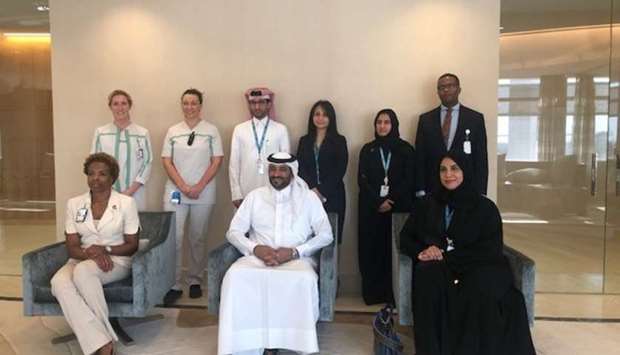Sidra Medicine, the specialist women’s and children’s hospital, has signed an agreement with the Assistive Technology Centre, Mada.
Under the agreement, Mada will provide assistive technologies that will help with increasing, maintaining or improving the functional capabilities of persons with disabilities who are being cared for at Sidra Medicine. Mada will also offer training to Sidra Medicine’s speech, physio and occupational health therapists, a press statement notes.
Commenting on the partnership, Sidra Medicine CEO Peter Morris said: “Sidra Medicine continues to build foundations that take a patient- and family-centred approach to care. Our partnership with Mada is a step in the right direction as we work towards helping our young patients become active participants in their own care.
"We are incredibly proud of our pediatric rehabilitation teams and therapists and by upskilling them with the Mada assistive technology training to advance the healthcare services available for people with disabilities.”
The Mada devices, which are available in Arabic and English, help children without language to communicate, express new ideas and integrate into schools and the community. High tech 'eye-gaze' equipment such as customised iPads will allow the children to simply gaze at a particular letter or icon on a screen and create language. The devices are particularly helpful for young patients with conditions like Anarthria and Spinal Muscular Atrophy, the statement explains. Children with these conditions are often non-verbal and typically use assistive technologies to access communication.
Maha al-Mansouri, CEO of Mada, said: “As a non-profit organisation, Mada works closely with organisations across Qatar to raise awareness and support persons with disabilities. Our agreement with Sidra Medicine demonstrates a joint commitment to empower children and young people – many who are vulnerable on account of their disabilities - with the right tools and support systems to enrich their lives and play a key role in our community.”
The agreement with Sidra Medicine also covers the training of its therapists in the skills necessary to assess children with disabilities and recommend the correct assistive technology device. The therapists will be certified according to the Rehabilitation Engineering and Assistive Technology Society of North America, the internationally recognised certifying body for assistive technology professionals.
Dr Lisa Thornton, division chief of Paediatric Rehabilitation Medicine at Sidra Medicine, added: “We are committed to providing not only the clinical and rehabilitation services and in this instance the assistive technologies that will help the children assimilate, go about their daily tasks and achieve their fullest potential. Our intention is to further develop the programme at Sidra Medicine whereby the technologies, the assessment and the certified staff will be a key draw for patients in Qatar and beyond.”
Commenting on the partnership, Sidra Medicine CEO Peter Morris said: “Sidra Medicine continues to build foundations that take a patient- and family-centred approach to care. Our partnership with Mada is a step in the right direction as we work towards helping our young patients become active participants in their own care.
"We are incredibly proud of our pediatric rehabilitation teams and therapists and by upskilling them with the Mada assistive technology training to advance the healthcare services available for people with disabilities.”
The Mada devices, which are available in Arabic and English, help children without language to communicate, express new ideas and integrate into schools and the community. High tech 'eye-gaze' equipment such as customised iPads will allow the children to simply gaze at a particular letter or icon on a screen and create language. The devices are particularly helpful for young patients with conditions like Anarthria and Spinal Muscular Atrophy, the statement explains. Children with these conditions are often non-verbal and typically use assistive technologies to access communication.
Maha al-Mansouri, CEO of Mada, said: “As a non-profit organisation, Mada works closely with organisations across Qatar to raise awareness and support persons with disabilities. Our agreement with Sidra Medicine demonstrates a joint commitment to empower children and young people – many who are vulnerable on account of their disabilities - with the right tools and support systems to enrich their lives and play a key role in our community.”
The agreement with Sidra Medicine also covers the training of its therapists in the skills necessary to assess children with disabilities and recommend the correct assistive technology device. The therapists will be certified according to the Rehabilitation Engineering and Assistive Technology Society of North America, the internationally recognised certifying body for assistive technology professionals.
Dr Lisa Thornton, division chief of Paediatric Rehabilitation Medicine at Sidra Medicine, added: “We are committed to providing not only the clinical and rehabilitation services and in this instance the assistive technologies that will help the children assimilate, go about their daily tasks and achieve their fullest potential. Our intention is to further develop the programme at Sidra Medicine whereby the technologies, the assessment and the certified staff will be a key draw for patients in Qatar and beyond.”

